Category: Property
September 2nd, 2017 by geoffhodgson1946
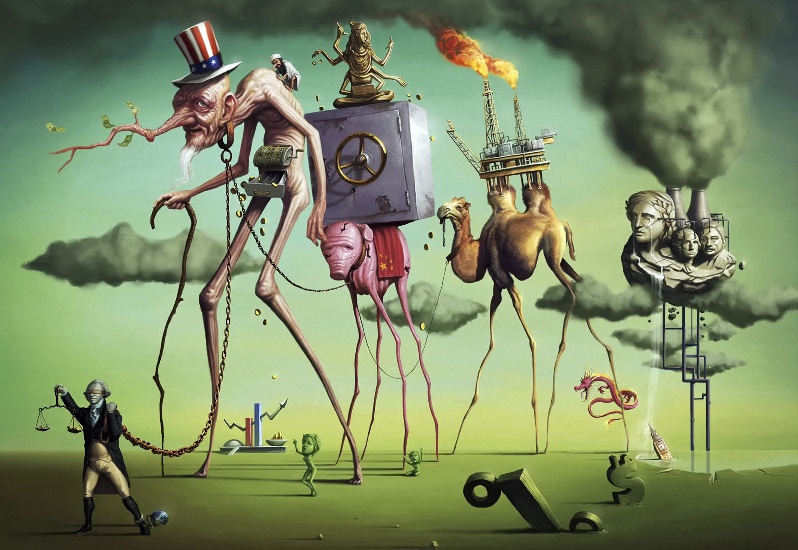
Geoffrey M. Hodgson
In terms of basic assumptions, Marxism has more in common with some prominent versions of so-called “neoliberalism” than is generally understood. Obviously, Marxism is opposed to a market economy. But some core ideas by Karl Marx and Frederick Engels are remarkably similar to those of some so-called “neoliberals”. For example, Marx’s definition of property resembles that of Ludwig von Mises.
But the parallels go much further, and are disturbing in their consequences. They concern the independence of the legal system and the nature and legitimation of democracy. They also concern the viability of civil society and the autonomy of personal and social life.
The argument here shows that liberalism – both historically and currently – is very different from some modern versions of “neoliberalism”. This “neoliberalism” is theoretically closer to Karl Marx than to Thomas Paine or John Stuart Mill.
Marxism undermines the autonomy of politics and civil society
The Marxian analysis of capitalism treats law and the state as an expression of class interests, which in turn are grounded on “economic relations”. Hence, for Marx, law and the state “originate in the material conditions of life“. They are part of the “superstructure” built upon the “economic base”.
The Marxist analytical reduction of everything to economics does not stop there. Consider the notion of civil society.
Civil society generally connotes a realm of free, partly self-organising, property-owning citizens, who interact under the rule of the state and its laws. In most accounts it includes private business and markets, but it is not reducible to them. It also embraces many forms of social association (including recreation, religion and philanthropy) that are not driven by business interests.
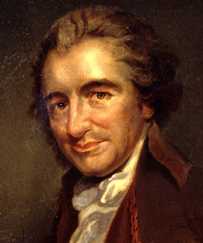
Thomas Paine
Distinctions between civil society and the state, and between civil society and the narrower world of trade and business, were developed by Enlightenment liberal writers such as Adam Smith, Adam Ferguson, Thomas Paine, Alexis de Tocqueville and others. They are crucial for modern liberal theory.
In its analysis of capitalism, Marxism made the state, law, politics and civil society all analytically subservient to markets and business.
These may be regarded as extreme formulations within Marxism. Certainly there are more sophisticated treatments by Marxists of civil society and the state, not least by Antonio Gramsci. But Marxism is severely impaired by the words of its founders.
The above extracts concern the Marxian analysis of capitalism, not its vision of an ideal society, which of course is strikingly different from that of (neo)liberals. While the Marxian analysis of capitalism undermines the conceptual distinction between civil society and the state – by making them both subservient to economic relations – Marxian politics also dissolves it in practice.
In his early tract On the Jewish Question, Marx argued that civil society and political society should become one and the same. In practice, under socialism, once much of the economy becomes a state bureaucracy. With private association under restriction, the scope of civil society is much diminished.
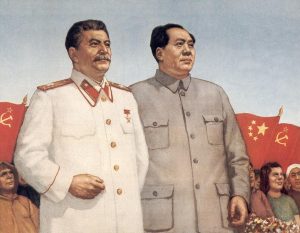 The conceptual and practical degradation of civil society is but one of the roots of totalitarianism within Marxism. Other sources are discussed elsewhere. The smothering of civil society within the party-state makes opposition more difficult and paves the way to dictatorship – a process witnessed in all Marxist regimes, from Russia to Venezuela.
The conceptual and practical degradation of civil society is but one of the roots of totalitarianism within Marxism. Other sources are discussed elsewhere. The smothering of civil society within the party-state makes opposition more difficult and paves the way to dictatorship – a process witnessed in all Marxist regimes, from Russia to Venezuela.
The reclamation of civil society by Eastern European dissidents
Long before the fall of the Berlin Wall in 1989, underground opposition groups had developed in several Soviet Bloc countries. After the crushing of the Hungarian Uprising in 1956, and after the Soviet invasion of Czechoslovakia in 1968, opposition to the Marxist party-state became most developed in Poland.

Leszek Kolakowski
In 1971 the Polish intellectual Leszek Kołakowski wrote his Theses on Hope and Despair. These were circulated illegally in his home country.
Kołakowski complained that the Soviet-style regime had “monopolistic power” that impelled “the atomization of society and the destruction of all forms of social life not prescribed by the ruling apparat.” He called for a pluralist society with genuine freedom of information, discussion and association.
 Subsequently, other Eastern European intellectuals such as Jacques Rupnik called for “the rebirth of civil society”. After the formation of the mass trade union movement Solidarity in Poland in 1980, still more voices were added. The Hungarian Andrew Arato wrote in 1981 of the new dissident wave:
Subsequently, other Eastern European intellectuals such as Jacques Rupnik called for “the rebirth of civil society”. After the formation of the mass trade union movement Solidarity in Poland in 1980, still more voices were added. The Hungarian Andrew Arato wrote in 1981 of the new dissident wave:
“one point unites them all: the viewpoint of civil society against the state – the desire to institutionalize and preserve the new level of social independence.”
Before its unexpected elevation to political power in 1989, Solidarity saw itself as essentially a movement for the “self-defence” of civil society against totalitarian power.
But while the dissidents drew on Enlightenment and liberal thought, their political philosophy was often underdeveloped. After 1989, many former dissidents became influenced by extreme forms of market libertarianism. But given the parallels – explored below – between this “neoliberalism” and Marxist thought, there was more continuity in their thinking than immediately meets the eye.
Market universalism
To understand the connection between “neoliberalism” and Marxism we need first to address a much broader phenomenon within social science.
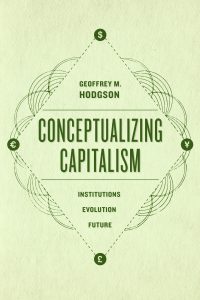 There is a widespread tendency to use the language of trade and markets to describe phenomena that are neither traded nor markets. I gave some examples in my Conceptualizing Capitalism book. I here call it market universalism.
There is a widespread tendency to use the language of trade and markets to describe phenomena that are neither traded nor markets. I gave some examples in my Conceptualizing Capitalism book. I here call it market universalism.
Consider the notion of a “market for ideas”, which can be found in the writings of Nobel Laureate Ronald Coase. He did not refer to intellectual property but to conversation and freedom of expression.
Douglass North, another Nobel Laureate, wrote of “political markets”. He was not referring to vote-buying (in countries like India) or political bribery, but to the general process of multi-party competition in a democracy.
In a paper published in 1988, Bruce Benson and Eric Engen envisioned “the legislative process as a market for laws” where interest groups “pay” legislators for laws as “products”.
By minimal criteria, none of these is a market. Rules concerning contracts, enforcement and property rights are lacking.
For example, the ordinary communication or debating of ideas does not involve enforceable contracts. Generally, conversation is not an intentional transfer of property rights.
Similarly, if we vote for a politician or a party that does not typically amount to an enforceable agreement. Competition between politicians or parties for votes or power is not a contest for contracts under any established system of contractual rules.
Likewise, with the supposed “market for laws”, in reality there are rarely any enforceable contracts between interest groups and legislators.
There is a further problem. What would be the system of rules under which these supposed “contracts” between legislators and interest groups are formed and enforced? Hence a “market for laws” would require supra-legal institutions with their own (legal or other) rules. We would need markets for markets-for-laws, or markets for meta-rules.
This reveals a problem of an infinite regress, showing that not everything can be placed on a market. My Conceptualizing Capitalism book gives further reasons why markets cannot be universal. There will always be missing markets.
Market universalism and “neoliberalism”
Although market universalism may be dismissed as the harmless use of metaphor, it contains dangerous policy temptations.
Making everything a market denies the autonomy of law and politics: everything is subsumed within the market zone. All forms of association are regarded as market-like or contractual arrangements. Legal and political relations or rights are reduced to the “economic” facts of possession or control.
The temptation is to downgrade all non-commercial justifications for democracy, law or social life. Everything is forced into the conceptual straitjacket of property and contract, and evaluated in terms of profit and loss.
Previous liberal thinkers had defended rights to private property, other human rights, plus institutions such as democracy. By contrast, market universalism can highlight control over property first, on the grounds that it is the foundation of all other rights and liberties. Property moves from being a necessary but insufficient condition of liberty, to being necessary and sufficient for the same.
 This transforms the Enlightenment argument that the government must be legitimated by representative democracy, rather than by tradition or divine rule. The “political market” makes democracy a market, and market-like criteria become the overriding source of legitimation for everything.
This transforms the Enlightenment argument that the government must be legitimated by representative democracy, rather than by tradition or divine rule. The “political market” makes democracy a market, and market-like criteria become the overriding source of legitimation for everything.
Furthermore, democracy may be seen as secondary or expedient, especially when property or markets are perceived as being under threat. By treating democracy as another market, a temptation is to regard markets and property as generally more important or supreme than democracy.
Consequentially, market universalism enables something very different from other forms of liberalism, and it involves a radically modified conceptual foundation. One may be tempted to call it neoliberalism.
This is the label suggested by Philip Mirowski, who addressed what he called the Mont Pèlerin “thought collective”. In a perceptive essay on this influential intellectual movement, which involved Friedrich Hayek, Milton Friedman, Ludwig von Mises and others, Mirowski identified several of its traits including the following:
“Skepticism about the lack of control of democracy is offset by the persistent need to provide a more reliable source of popular legitimacy for the neoliberal market state. Neoliberals seek to transcend the intolerable contradiction by treating politics as if it were a market and promoting an economic theory of democracy.”
Foundations of anti-democratic authoritarianism
We can now see what Marxists and market universalists have in common. They all look upon capitalism as system where everything is reducible to a market.
For Marxists, this means that civil society is nothing more than the sphere of business and individual greed. In addition, the political and legal spheres are simply reflections of these business interests.
A policy consequence – after the socialist revolution – is to destroy civil society and absorb it into politics and the state. This forms part of the Marxist foundation for totalitarianism.
Of course, for “neoliberals”, markets are always beneficial. But the problem is much more serious than their ever-familiar agoraphilia.
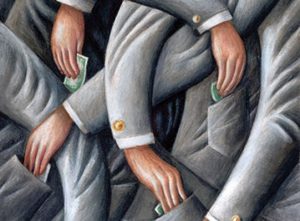 Through notions such as “political markets” and “markets for laws”, market universalist “neoliberals” reduce the state and its legal system to a grand marketplace. The state and law become additional markets alongside others. The policy temptation is the practical marketization of the state and the doctrinal denial of the autonomy of politics.
Through notions such as “political markets” and “markets for laws”, market universalist “neoliberals” reduce the state and its legal system to a grand marketplace. The state and law become additional markets alongside others. The policy temptation is the practical marketization of the state and the doctrinal denial of the autonomy of politics.
Once politics and all civil society are seen through the lenses of trade and markets, then the basic elements of property and contract become supreme. Instead of being a necessary but insufficient precondition of liberty, property becomes both necessary and sufficient.
This transforms the Enlightenment argument that the government must be legitimated by representative democracy, rather than by divine rule. The “political market” makes democracy a market, and this becomes the overriding source of legitimation.
Consequently, democracy becomes secondary or expedient, especially when property or markets are perceived as being under threat. By treating democracy as another market, a temptation is to regard markets and property as generally more important or supreme than democracy.
Leading “neoliberals” like von Mises and Hayek have been described as classical liberals. But their views are a departure in important respects from the Enlightenment liberalism of the eighteenth and nineteenth centuries, and from other more recent currents of liberal thinking. In some important respect they are closer to Karl Marx than John Stuart Mill.
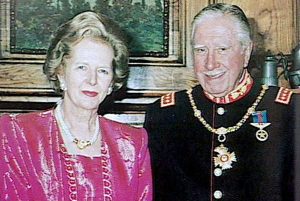
Margaret Thatcher and Augusto Pinochet
Their supreme emphasis on property rights explains why some “neoliberals” have dallied with dictators. For example, in a book originally published in 1927, von Mises praised fascism as “an emergency makeshift” that “has, for the moment, saved European civilization”. Hayek was notoriously silent about the human rights violations in Chile under the dictator Pinochet. These fascist or dictatorial regimes were seen by them as saviours of private property.
Conclusion: liberalism is not “neoliberalism”
Despite their opposed policy stances, Marxism and the type of market-universalist “neoliberalism” discussed here have similarities at their theoretical foundations. While Marxism reduces the analysis of civil society and politics to an economistic world dominated by self-seeking egoists, this “neoliberalism” does exactly the same.
Within this version of “neoliberalism”, everything is legitimated by free contract in unfettered markets in all spheres of human interaction, including within the state itself. Like Marxism, it reduces everything to economics.
This entails a radical break from other forms of liberalism, and from all other doctrines that recognise the relative autonomy of the political and legal spheres from the economy and from civil society.
2 September 2017
Minor edits – 8, 10 September 2017
This book elaborates on some of the political issues raised in this blog:
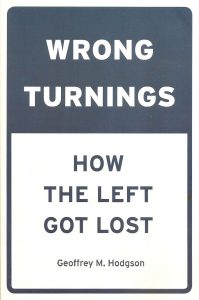
Published by University of Chicago Press in January 2018
References
Arato, Andrew and Cohen, Jean (1992) Civil Society and Democratic Theory (Cambridge, MA: MIT Press).
Benson, Bruce L. and Engen, Eric M. (1988) ‘The Market for Laws: An Economic Analysis of Legislation’, Southern Economic Journal, 54(3), January, pp. 732-745.
Caldwell, Bruce J. and Montes, Leonidas (2015) ‘Friedrich Hayek and his Visits to Chile’, Review of Austrian Economics, 28(3), pp. 261-309.
Cohen, Jean (1982) Class and Civil Society: The Limits of Marxian Critical Theory (Oxford, Martin Robertson).
Hodgson, Geoffrey M. (2015) Conceptualizing Capitalism: Institutions, Evolution, Future (Chicago: University of Chicago Press).
Hodgson, Geoffrey M. (2017) Wrong Turnings: How the Left Got Lost (Chicago: University of Chicago Press, forthcoming).
Keane, John (ed.) (1988) Civil Society and the State (London: Verso).
Keane, John (1995) Tom Paine: A Political Life (London: Bloomsbury).
Keane, John (1998) Civil Society: Old Images, New Visions (Cambridge: Polity).
Kumar, Krishan (1993) ‘Civil Society: An Inquiry into the Usefulness of an Historical Term’, British Journal of Sociology, 44(3), September, pp. 375-395.
Mirowski, Philip and Plehwe, Dieter (eds) (2015) The Road from Mont Pèlerin: The Making of the Neoliberal Thought Collective, paperback edition (Cambridge MA: Harvard University Press). (Quote from p. xvii.)
Mises, Ludwig von (1985) Liberalism in the Classic Tradition. Translated from the German edition of 1927 (Irvington, NY: Foundation for Economic Education).
Polan, Anthony J. (1984) Lenin and the End of Politics (London: Methuen).
Venugopal, Rajesh (2015) ‘Neoliberalism as a Concept’, Economy and Society, 44(2), pp. 165-87. http://www.tandfonline.com/doi/abs/10.1080/03085147.2015.1013356.
Posted in Common ownership, Democracy, Karl Marx, Left politics, Leszek Kolakowski, Liberalism, Ludwig von Mises, Markets, Neoliberalism, Politics, Private enterprise, Property, Right politics, Socialism, Soviet Union, Venezuela
May 21st, 2017 by geoffhodgson1946
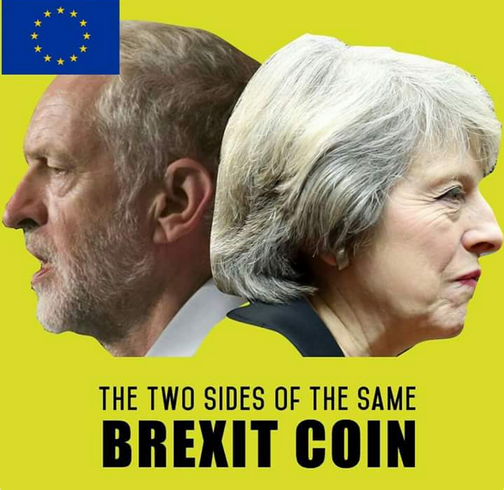
Geoffrey M. Hodgson
Although the two biggest UK political parties are very different in important respects, Labour under Jeremy Corbyn and the Conservatives under Theresa May have each converged on different forms of pro-Brexit, economic nationalism.
Economic nationalism prioritises national and statist solutions to economic problems. Although it does not shun them completely, it places less stress on global markets, international cooperation and the international mobility of capital or labour. It believes that the solutions to major economic, political and social problems lie within the competence of the national state.
 Other countries have turned in the same direction, including the United States under Donald Trump and Russia under Vladimir Putin. Previously, both Soviet-style and fascist economies have embraced economic nationalism. China has continued along this road, even after its acceptance of private enterprise and a market economy.
Other countries have turned in the same direction, including the United States under Donald Trump and Russia under Vladimir Putin. Previously, both Soviet-style and fascist economies have embraced economic nationalism. China has continued along this road, even after its acceptance of private enterprise and a market economy.
Economic nationalism has been used successfully as a tool of economic development, by creating a state apparatus to build an institutional infrastructure and mobilise resources. But it brings severe dangers as well as some advantages. Its reliance on nationalist rhetoric can feed intolerance, racism and extremism.
Furthermore, as it concentrates economic and political power in the hands of the state, economic nationalism undermines vital checks and balances in the politico-economic architecture.
As numerous social scientists (from Barrington Moore to Douglass North) have shown, democracy and human rights cannot be safeguarded without a separation of powers, backed by powerful countervailing politico-economic forces that keep the state in check.
From Thatcherism to Mayhem: Tory economic nationalism
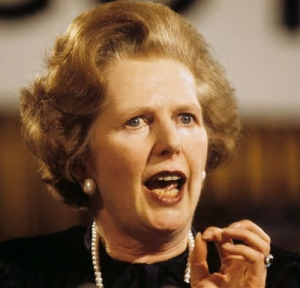
Margaret Thatcher
In the 1970s, Margaret Thatcher changed the Tory party from a paternalist party of the elite to a more radical, free-market and individualist force, embracing the ideologies of Friedrich Hayek and Milton Friedman.
A logical consequence of this market fundamentalism was to embrace the European Single Market, which her successor John Major did in the Maastricht Treaty of 1992. But this was too much for the Tory nationalists, who were already turning against the European Union and all its works.
The tension grew within the Tories between those that pursued international markets in the name of market fundamentalism, and those who worried that global trade and the free movement of labour were undermining the powers of the British nation state.
A compromise option – widely touted during the June 2016 EU referendum – was to exit the EU but remain in the single market. But a major implication of this was that the free movement of labour to and from the EU would have to be retained. May became prime minister and declared that Britain would leave the single market as well as the EU.
This marks a major ideological shift within the Conservative Party. The pursuit of free markets, promoted so zealously by Thatcher, has moved down the Tory agenda, in favour of nationalism, increased state control, reduced parliamentary scrutiny, and lower immigration, whatever the economic costs.
Forward together: the new-old Toryism
This shift is signalled by a remarkable passage in the 2017 Conservative general election manifesto:
“We do not believe in untrammelled free markets. We reject the cult of selfish individualism.”
This could be interpreted as a cynical attempt to attract some Labour voters. Probably, in part, it is. But there is much more to it than that. It shows how all the whingeing about “neoliberalism” is now outdated and much off the mark.
Crucially, the Tory Party was traditionally opposed to “untrammelled free markets” and it worried about the destructive and corrosive effects of individualism and greed.
As Karl Polanyi pointed out in his classic book on The Great Transformation, the first fighters for factory and employment legislation, to protect workers from the results of reckless industrialization in the 1830s and 1840s, were from the ranks of the church and the Tory Party:
“The Ten Hours Bill of 1847, which Karl Marx hailed as the first victory of socialism, was the work of enlightened reactionaries.”1
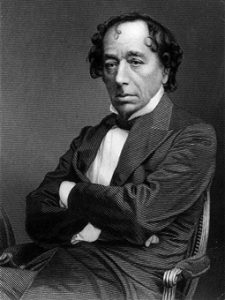
Benjamin Disraeli
Tories like Anthony Ashley-Cooper, the Seventh Earl of Shaftesbury, were great nineteenth-century social reformers. The Tory Prime Minister Benjamin Disraeli railed against selfish individualism, particularly in his novels. For Disraeli, British imperialism was more important than unalloyed individualism.
May has brought the Tory party back to its pre-Thatcher roots. But, less enlightened than Shaftesbury or Disraeli, she has little appetite for protective legislation or constitutional reform. Instead, she celebrates her own powers of leadership and seeks a mandate to concentrate power in her hands.
She has little enthusiasm for democracy either. If it were not for the heroic efforts of Gina Miller and the decision of the Supreme Court, the triggering of Article 50 – to start the process of leaving the European Union – would have been taken by the executive without a parliamentary vote.
The 2017 Tory manifesto is a maypole for nationalism. “Britain” is one of its most-used words. It says that immigration will be brought down, while existing powers by the British state to read emails and monitor your activity on the web will be increased. She will create an Internet that is controlled by the state. May is developing the infrastructure of an authoritarian nationalist regime.
Bringing the state back in: Labour’s new-old economic nationalism
At least on the surface, there are dramatic differences with Labour’s manifesto, which, for example, contains more measures targeted at the poor and elderly. Labour also gives much more verbal emphasis to human rights and democracy.
But at the core of Labour’s 2017 manifesto is a strong dose of economic nationalism, with Labour’s greatest commitment to public ownership since the “suicide note” manifesto of 1983. There are plans to bring the railways, energy, water and the Royal Mail all back into public ownership.
The 2017 manifesto declares: “Many basic goods and services have been taken out of democratic control through privatization.” But there is little explanation of what “democratic control” would mean under public ownership.
How would it work? Would parliament take decisions on everything? In reality these proposals – whatever their other merits – would enlarge state bureaucracy: there is no explanation how they would extend democracy.
The words “control” or “controls” appear 32 times in the 2017 manifesto. There is insignificant explanation of how “controls” work. The Labour manifesto envisions a concentration of economic power in the hands of the state, notwithstanding its verbal commitment to regional and local, as well as national, public management.
While there are commendable measures to enhance and enlarge an autonomous sector of worker-owned enterprises, there is little recognition of the importance of having a viable and dynamic private sector as well.
Corbyn’s Labour: forward to the past
As May has brought the Tories back to the pre-Thatcher years, Corbyn has brought Labour back to its traditional roots, before the leadership of Tony Blair.
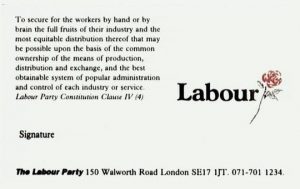 With his 1995 changes to Clause Four of the Labour Party Constitution, Blair brought in an explicit commitment to a dynamic private sector. Labour stood for an economy where “the enterprise of the market and the rigour of competition are joined with the forces of partnership and co-operation”. Corbyn has returned to the spirit of Labour pre-1995 constitution, even if he has not yet changed the wording.
With his 1995 changes to Clause Four of the Labour Party Constitution, Blair brought in an explicit commitment to a dynamic private sector. Labour stood for an economy where “the enterprise of the market and the rigour of competition are joined with the forces of partnership and co-operation”. Corbyn has returned to the spirit of Labour pre-1995 constitution, even if he has not yet changed the wording.
Corbyn has proposed that Britain can be “better off” outside the EU. He argued that EU rules block the kind of state-heavy industrial policy that he favours. But EU countries such as France and Germany already have strong interventionist policies for industrial and infrastructural development. In truth, Corbyn favours repeated doses of statist socialism in one country.
With some Stalinist exceptions in his coterie, Corbyn and his followers are mostly sincere in their commitment to democracy and human rights. But what they do not understand is that their proposed statist concentration of economic power will undermine countervailing politico-economic forces that can help to keep the state leviathan in check.

Jeremy Corbyn and Hugo Chávez
These countervailing and separated powers are vital. Especially in times of hardship or crisis, there will be a temptation by some in power (at the local or national level) to abuse rights and undermine democracy. Every single historical case shows this result.
Attempts “to take control of the economy”, even with measures of decentralization and local power, have led to restrictions on press freedom, arbitrary detentions, abuses of human rights, and even famine.
Forward together: economic nationalists take the helm
Further doses of economic nationalism may be possible in a country as large as the United States. In 2015, exports from the USA amount to about 13 per cent of GDP. Hence economic nationalists in the USA can reduce trade without too much contraction of the economy. It may turn further inwards, cut imports and still survive a loss of exports.
But the UK has become a globally-orientated, open economy, exporting 28 per cent of its GDP in 2015. About 45 per cent of these exports go to the European Union.
 By exiting the EU Single Market, and by walking away from EU trade deals with non-EU countries that benefit EU member states, Labour and the Tories would threaten the UK economy with a massive downturn. The British economy would fall off a cliff.
By exiting the EU Single Market, and by walking away from EU trade deals with non-EU countries that benefit EU member states, Labour and the Tories would threaten the UK economy with a massive downturn. The British economy would fall off a cliff.
In this crisis, rightist economic nationalists will blame foreigners and immigrants, and leftist economic nationalists will blame the rich.
It will be “the few” – designated by their ethnicity or by their assets – who will get the blame. Their rights will be under threat, as so will the liberties of all of us. Whatever variety is chosen, economic nationalism could severely undermine the viability of democracy in the UK.
21 May 2017
Minor edits – 23, 28 May, 29 June
|
This book elaborates on some of the political issues raised in this blog:
Wrong Turnings: How the Left Got Lost
Published by University of Chicago Press in January 2018
|
Endnote
Bibliography
Hodgson, Geoffrey M. (2017) Wrong Turnings: How the Left Got Lost (Chicago: University of Chicago Press, forthcoming).
Moore, Barrington, Jr (1966) Social Origins of Dictatorship and Democracy: Lord and Peasant in the Making of the Modern World (London: Allen Lane).
North, Douglass C., Wallis, John Joseph and Weingast, Barry R. (2009) Violence and Social Orders: A Conceptual Framework for Interpreting Recorded Human History (Cambridge and New York: Cambridge University Press).
Polanyi, Karl (1944) The Great Transformation: The Political and Economic Origins of Our Time (New York: Rinehart). See esp. pp. 165-66.
Posted in Brexit, Common ownership, Democracy, Donald Trump, Immigration, Jeremy Corbyn, Labour Party, Left politics, Liberalism, Markets, Nationalization, Politics, Populism, Private enterprise, Property, Right politics, Tony Blair, Tony Blair, Uncategorized, Venezuela
May 8th, 2017 by geoffhodgson1946
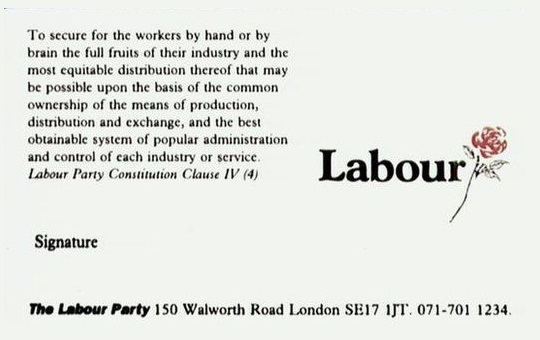
Geoffrey M. Hodgson
This is in part a personal memoir – concerning my role in a minor episode in political history. More importantly, it has lessons concerning Labour’s ideological inertia – the difficulty of modernising the party and bringing it from the nineteenth to the twenty-first century.
Socialism and Labour’s Clause Four
Both Robert Owen and Karl Marx defined socialism as “the abolition of private property”. This kind of collectivist thinking was encapsulated in Clause Four, Part Four of the Labour Party Constitution when it was adopted in 1918:
“To secure for the workers by hand or by brain the full fruits of their industry and the most equitable distribution thereof that may be possible upon the basis of the common ownership of the means of production, distribution and exchange, and the best obtainable system of popular administration and control of each industry or service.”
This provided for no exception: all production would be in common ownership and there would be no private sector. Although some Labour Party thinkers began to entertain the possibility of some private enterprise, many party members remained resolutely in support of widespread common ownership.
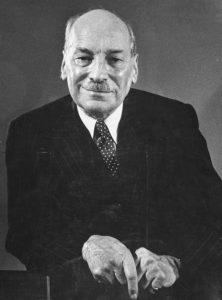
Clement Attlee
In 1937, eight years before he became Prime Minister, Clement Attlee approvingly quoted the words of Bertrand Russell: “Socialism means the common ownership of land and capital together with a democratic form of government. … It involves the abolition of all unearned wealth and of all private control over the means of livelihood of the workers.”
After 1945, the position of many leading Labour Party members began to shift. First the realities of gaining and holding on to power – as a majority party for the first time – dramatized the political and practical unfeasibility of abolishing all private enterprise. Some nationalization was achieved, but a large private sector remained.
In 1956 C. Anthony Crosland published The Future of Socialism. This sought a reconciliation with markets, private enterprise and a mixed economy. In 1959 the (West) German Social Democratic Party abandoned the goal of widespread common ownership. In the same year, Hugh Gaitskell tried to get the British Labour Party to follow this lead, but met stiff resistance. Clause Four remained intact.
Richard Toye noted that the Labour Party assumed widespread public ownership and failed to develop adequate policies concerning the private sector:
“Labour, until at least the 1950s, showed little interest in developing policies for the private sector. During the 1960s, the party demonstrated continuing ambiguity about whether or not competition was a good thing. This ambiguity continued at least until the 1980s.”
The Thatcher Revolution
There were Labour governments from 1964 to 1970 and from 1974 to 1979. But then Margaret Thatcher came to power.
After this defeat, Labour’s instinct was to turn to the left, in the belief that it could have held onto power if it had held to classical socialist principles. Michael Foot was elected as leader, and Dennis Healey narrowly defeated Tony Benn for the position of deputy leader.
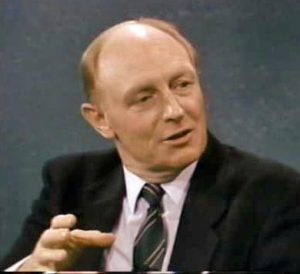
Neil Kinnock
Despite a severe recession with millions unemployed, following the implementation of monetarist austerity policies, Labour suffered a massive defeat in the 1983 general election. Labour’s share of the vote fell below 28 per cent – the party’s lowest figure since 1918. Michael Foot resigned as leader and Neil Kinnock took his place.
Thatcher had boosted her popularity due the Falklands War. One of Thatcher’s most popular domestic policies was to promote the sale of council-owned housing to the tenants. Labour had opposed this policy. The 1983 defeat prompted a rethink, on this and other issues.
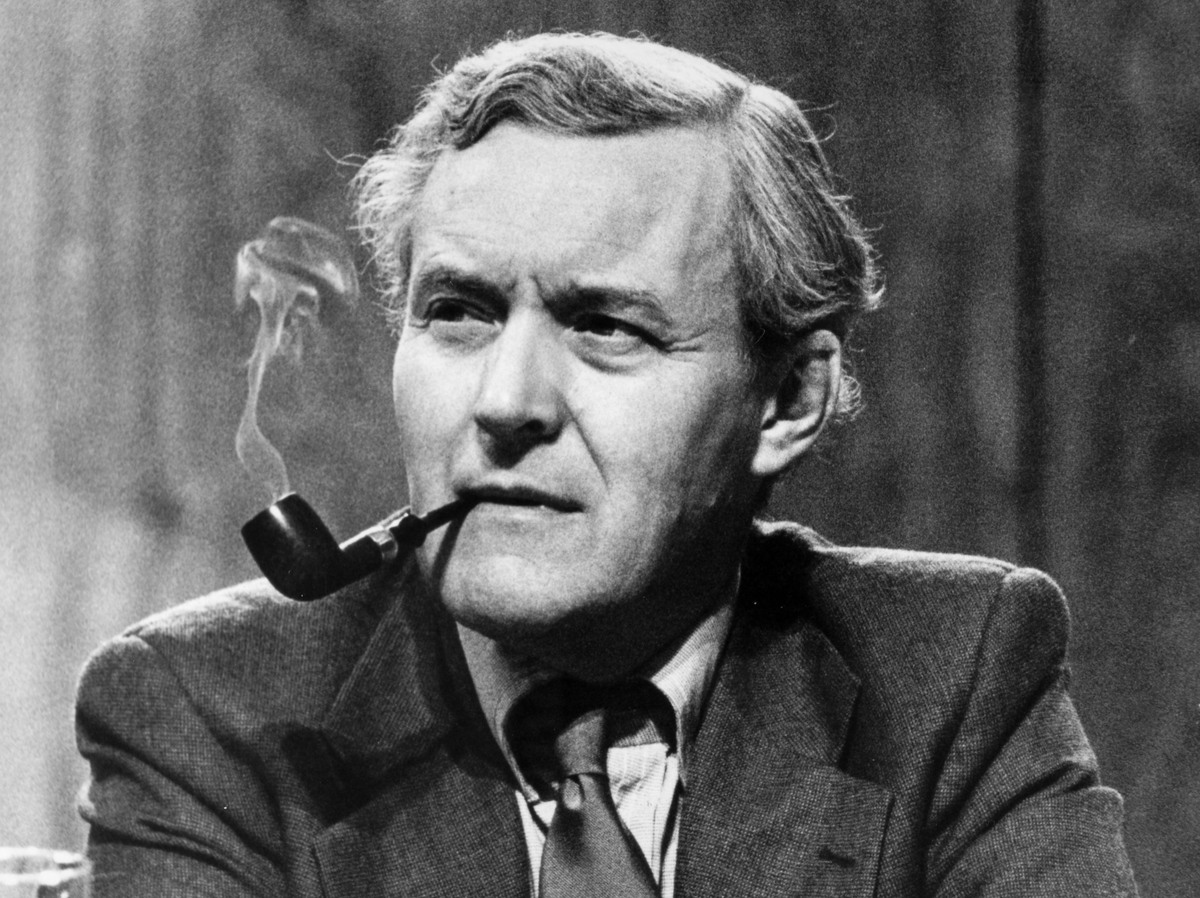
Tony Benn
For some of us, this rethink amounted to more than expedient doctrinal trimming. Encouraging home ownership was really a good idea: why should all property be owned by the rich? But while supporting home ownership, we argued that the government should also build more social housing and enlarge the stock available for rent by low-income families.
But these ideas met stiff resistance in the Labour Party ranks, and not simply from Trotskyist entryists such as Militant. The resistance from Tony Benn and his supporters was substantial and even more enduring. It was clear that old-fashioned socialist ideas still had a tenacious appeal for Labour’s membership.
The Labour Coordinating Committee
The Labour Coordinating Committee (LCC) became one of the primary modernising forces within Labour. Its leadership included Hilary Benn, Cherie Blair, Mike Gapes, Peter Hain, Harriet Harman and others of enduring fame. I was elected to its executive committee. We worked closely with Kinnock and members of his shadow cabinet, including Robin Cook.
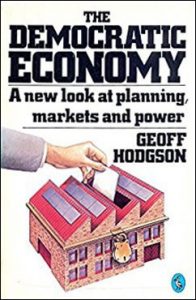 I had written a book entitled The Democratic Economy where I argued that socialists should support a permanent private sector in the economy. The book was published by Penguin in 1984. Another influential work at the time was Alec Nove’s Economics of Feasible Socialism, which also argued for a substantial role for markets.
I had written a book entitled The Democratic Economy where I argued that socialists should support a permanent private sector in the economy. The book was published by Penguin in 1984. Another influential work at the time was Alec Nove’s Economics of Feasible Socialism, which also argued for a substantial role for markets.
On 26 November 1983, at the Labour Coordinating Committee AGM in Birmingham, I proposed that Clause Four of the Labour Party constitution should be rewritten to include an acceptance of a private sector and a role for markets. But I was defeated over the idea that Clause Four should be rewritten. This was out of fear of antagonising the Benn wing. Instead, the LCC resolved that Clause Four should be “clarified”.
But a resolution on long-term aims, which I had helped to draft, was passed by a large majority. The resolution called for the Labour Party to draft a new statement of aims, upholding “that socialism involves extended democracy and real equality. Democracy under socialism is extended to industry and the community … and must involve a substantial decentralisation of power.”
Equality meant the “absence of discrimination on the basis of gender and race, universal freedom from poverty, and a widespread distribution of wealth and power, as well as formal equality under the law and universal suffrage.”
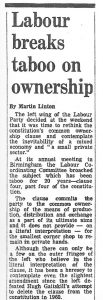 There was a commitment to “political pluralism” and to “economic pluralism” involving “a variety of forms of common ownership … and the toleration of a small private sector including self-employed workers and other private firms.” The economy must be dominated by mechanisms of “democratic planning … but also accommodating a market mechanism in some areas.”
There was a commitment to “political pluralism” and to “economic pluralism” involving “a variety of forms of common ownership … and the toleration of a small private sector including self-employed workers and other private firms.” The economy must be dominated by mechanisms of “democratic planning … but also accommodating a market mechanism in some areas.”
There was also a “commitment to internationalism, disarmament and peace” and “a disengagement from the power blocs” of the West and East.
I think that today Jeremy Corbyn and his followers would accept much or all of this, at least as a temporary stopping-point on the road to full socialism. But in the 1980s there was strong hostility to these revisionist ideas from within Labour’s ranks at the time, including from Corbyn and Tony Benn.
Since then my own views have adjusted. See my Wrong Turnings book. But this blog is not primarily about me. It is about what has happened to the Labour Party and how difficult it is to change its DNA.
For a while, the LCC tried to keep the conversation going on the need to revise Labour’s aims. The Guardian newspaper reported the LCC conference with the headline: “Labour breaks taboo on ownership”.
The LCC held a conference in Liverpool in June 1984 on “The Socialist Vision”. But enthusiasm for this discussion fizzled out. Many leaders of the LCC wanted a political career, and they wished to widen their support on constituency selection committees.
By 1985 the LCC’s revisionist initiative had been kicked into the long grass. My efforts to change Clause Four had failed.
From Kinnock to Blair
But to their credit, Neil Kinnock and his deputy Roy Hattersley saw the need for Labour to modernise its aims. I advised them both for a while. Another election defeat in 1987 spurred a rethink. But by then I had become inactive in the Labour Party.
As Richard Toye has recorded, in 1988 Kinnock and Hattersley presented a new document on “Aims and Values” to Labour’s National Executive Committee. But “it was criticised by John Smith, Bryan Gould and Robin Cook as being too enthusiastic about the benefits of the market, and was watered down accordingly”.

Tony Blair
Clearly, even after a third election defeat there was still strong resistance, from both the “soft” and the “hard left”, to the idea of embracing markets and private property.
After the next election defeat in 1992, Kinnock stood down. He was replaced by John Smith, who died tragically from a heart attack. Then Tony Blair became leader, with a firm resolve to modernize the party. Four election defeats had made the majority of members more receptive to his ideas.
Blair’s Revision of Clause Four
In 1995, after 77 years, Clause Four was changed. Tony Blair successfully ended the Labour Party’s longstanding constitutional commitment to far-reaching common ownership. Tony Benn protested: “Labour’s heart is being cut out”. The new wording of “Clause IV: Aims and Values” began as follows:
“The Labour Party is a democratic socialist party. It believes that by the strength of our common endeavour we achieve more than we achieve alone, so as to create for each of us the means to realise our true potential and for all of us a community in which power, wealth and opportunity are in the hands of the many not the few; where the rights we enjoy reflect the duties we owe and where we live together freely, in a spirit of solidarity, tolerance and respect.”
The 1918 formulation did not use the word socialism – it had common ownership instead. Ironically, Blair introduced the term in 1995. But he attempted to change its meaning. He promoted “social-ism”, which now meant recognizing individuals as socially interdependent. It also signalled social justice, cohesion and equality of opportunity.
The new Clause Four continued, to make a significant statement in support of competiive markets and a private sector. Labour now stood for:
“A DYNAMIC ECONOMY, serving the public interest, in which the enterprise of the market and the rigour of competition are joined with the forces of partnership and co-operation to produce the wealth the nation needs and the opportunity for all to work and prosper with a thriving private sector and high-quality public services …”
The text went on to cover “a just society”, “an open democracy”, “a healthy environment” and “defence and security”.
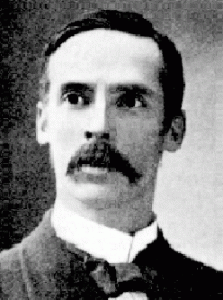
John A Hobson
Labour’s new aims and values were indistinguishable from the earlier views of radical social liberals, such as T. H. Green, J. A. Hobson and David Lloyd George. And with its endorsement of “the rigour of competition” and “a thriving private sector” it was a hundred miles away from the collectivism of Robert Owen and other original socialists.
Instead of tackling the problem of its old collectivist DNA more directly, Blair tried to change the meaning of socialism and even rewrote parts of its own history. It is unsurprising that the old socialist DNA survived. It remained viable, partly because Labour still declared itself as socialist. Blair made radical changes but also gave succour to the traditional socialist wing of the party.
Blair’s popularity within the party had waned even before his decision in 2003 to support George W. Bush’s Iraq War. Much of this disenchantment was due to his abandonment of wholesale common ownership.
Blair had failed to develop a fully-fledged alternative vision within Labour to replace old-fashioned common ownership. He had made Labour implicitly embrace liberalism in doctrine. But this was unspoken, and masked by the explicit insertion of socialism in its aims. This inadvertently played into the hands of the party’s enduring, backward-looking left.
Labour’s Love Lost
Just as Labour had shifted to the left after losing power in 1979, after its 2010 defeat it shifted slightly leftwards under Ed Miliband. But the new leader had no clear alternative to the economics of austerity. So after another defeat in 2015. the party membership took a massive lunge to the left. It elected the Bennite, retro-Marxist, perennial protestor, Jeremy Corbyn.
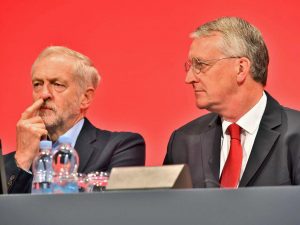 But while old ideas within Labour had survived, the structure of the party and its electoral base had changed enormously in the period from 1983 to 2015. Kinnock had relied on the moderating force of the trade unions, to fight the hard left and move the party toward electability. But by 2015 the unions had been gravely weakened and several had moved toward the hard left.
But while old ideas within Labour had survived, the structure of the party and its electoral base had changed enormously in the period from 1983 to 2015. Kinnock had relied on the moderating force of the trade unions, to fight the hard left and move the party toward electability. But by 2015 the unions had been gravely weakened and several had moved toward the hard left.
In 1983, both the affiliated unions and the Labour MPs had a major role in the election of any new Labour leader. But by 2015 the power was almost entirely in the hands of the Labour Party membership, and the other moderating forces were much diminished.
Labour’s history shows how difficult it has been to change Labour’s old-fashioned socialist DNA. Those that put their faith in a revival of moderation within must take into account the near-collapse of those internal forces that brought the party back to sanity in 1951-1964 and in 1979-1997.
In 1983 there was still a strong, traditional, tribal, Labour vote, part of it based on surviving industries such as coal and steel. By 2015 the working class was much more fragmented, with skilled, aspirational cohorts at one extreme, and uneducated, demoralized, welfare dependents at the other.
The old tribalism was challenged by UKIP and by a revived working class Conservatism, playing the nationalist card. Labour’s potential electoral base has been transformed beyond recognition. The division of labour has become profoundly political, as well as enduringly economic.
Today, there seems little hope for a party that calls itself “Labour”, just as there is no future for a party that retains the word “socialism” or the goal of widespread public ownership. The socialist experiments of the twentieth century testify to their failure. Labour, in short, is an anachronism.
8 May 2017
|
This book elaborates on some of the political issues raised in this blog:
Wrong Turnings: How the Left Got Lost
Published by University of Chicago Press in January 2018
|
References
Attlee, Clement R. (1937) The Labour Party in Perspective (London: Gollancz).
Blair, Tony (1994) Socialism, Fabian Pamphlet 565 (London: Fabian Society).
Clarke, Peter (1978) Liberals and Social Democrats (Cambridge: Cambridge University Press).
Hodgson, Geoffrey M. (1984) The Democratic Economy: A New Look at Planning, Markets and Power (Harmondsworth: Penguin).
Hodgson, Geoffrey M. (2017) Wrong Turnings: How the Left Got Lost (Chicago: University of Chicago Press, forthcoming).
Nove, Alexander (1983) The Economics of Feasible Socialism (London: George Allen and Unwin).
Toye, Richard (2004) ‘The Smallest Party in History’? New Labour in Historical Perspective’, Labour History Review, 69(1), April, pp. 83-104.
Posted in Common ownership, Democracy, Jeremy Corbyn, Karl Marx, Labour Party, Left politics, Liberalism, Markets, Nationalization, Politics, Private enterprise, Property, Robert Owen, Socialism, Tony Benn, Tony Blair, Tony Blair
April 28th, 2017 by geoffhodgson1946

Geoffrey M. Hodgson
In the May 2017 run-off between Emmanuel Macron and Marine Le Pen, the defeated first-round candidate Jean-Luc Mélenchon refused to endorse the liberal Macron over the neo-fascist Le Pen. Many of Mélenchon’s leftist supporters did the same, arguing positively for abstention.

Jean-Luc Mélenchon
The abstainers argued widely that Macron is a “neoliberal” and the voters faced a choice between the dictatorship of the market or a fascist president.
This failure to perceive any advantage of a pro-market liberal over the racist and neo-fascist authoritarian nationalism of Le Pen’s National Front, is a symptom of a deep ideological sickness that has endured for decades on the French Left.
The political degeneration of the French Left, which even exceeds that of its Corbynista counterpart in Britain, would be the subject of another blog. My purpose here is to focus on the abuse of the term “neoliberalism” and how this corrupted and overly-widened word has poisoned political discourse.
I also wish to show how some “neoliberals”, who do not include Macron, and whom I shall attempt to characterise more precisely than the n-word will allow, do indeed have connections with genuine fascism.
After the erosion of credibility in classical socialism, particularly after its failed experiments in the twentieth century, it must be understood that our sole alternative to the rising nationalisms of Le Pen, Trump, Putin, Xi, Erdoğan and others is a modern and democratic version of liberalism. Whatever his flaws, Macron fits into the latter category.
The degeneration of the “neoliberalism” label
The widespread use of the word “neoliberal” to describe anyone accepting a significant role for private property or markets has made the word so imprecise that it has become useless and beyond reform.
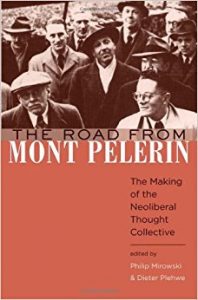 Even the foremost historians of “the neoliberal project” have acknowledged the problem. Philip Mirowski and Dieter Plehwe wrote:
Even the foremost historians of “the neoliberal project” have acknowledged the problem. Philip Mirowski and Dieter Plehwe wrote:
“We can sympathize with the impatience for those who use the term ‘neoliberalism’ as a blanket swearword for everything they despise, or a brainless synonym for modern capitalism.”
Colin Talbot pointed out that “neoliberalism” has become “a term of abuse” to be used against “any type of pro-market reform or political position that recognizes markets may – in the right circumstances – be a good thing”. Consequently, everyone “from moderate social democrats to the most lurid free-marketeers gets lumped together under a convenient ‘neoliberal’ label.”
In a superb survey of its usage since the 1980s, Rajesh Venugopal concluded that “neoliberalism has become a deeply problematic and incoherent term that has multiple and contradictory meanings, and thus has diminished analytical value.”
Some may wish to retain the “neoliberal” label, to apply it to those free marketeers who attempt to shrink radically the size of the state, to privatise anything that walks, advocate economic austerity and deregulate the financial sector. This would certainly separate neoliberalism from the genuine liberalism of John A. Hobson, William Beveridge or John Maynard Keynes.
But I think that things are too far gone to allow any useful redefinition of the “neoliberal” label to succeed. It is perhaps best abandoned. Instead I wish to focus on a particular strain of so-called “neoliberalism”. This allows us to concentrate on some key issues.
Ludwig von Mises and fascism
Ludwig von Mises (1881-1973) and Friedrich Hayek (1899-1992) were key figures in the so-called Austrian school of economics. Among their major achievements were their contributions to the “socialist calculation debate” where they showed the practical and epistemic limitations of any system of national planning based on comprehensive public ownership.
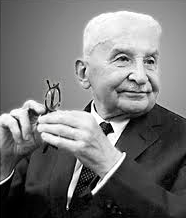
Ludwig von Mises
While sharing with liberals the support for a market economy based on private ownership, von Mises and Hayek departed from both classical liberalism (of John Stuart Mill, for example) and from twentieth-century liberalism (of John A. Hobson, John Dewey and John Maynard Keynes, for example), in some important respects.
In a book originally published in 1927, Ludwig von Mises praised fascism as “an emergency makeshift” that “has, for the moment, saved European civilization”. This statement cannot be excused, despite the facts that it was in a book that was otherwise devoted to the promotion of classical liberal values, and that von Mises was a Jew who eventually had to flee the Nazis.
From 1932 to 1934 von Mises continued as an economic adviser in Austria, even to the “Austro-fascist” or “clerical fascist” government of Chancellor Engelbert Dollfuss, who assumed dictatorial powers, closed down parliament, smashed the trade unions, and banned several political parties. This does not mean that von Mises was a fascist, but other economists would have drawn the line at advising them.
Friedrich Hayek and the dictatorship of Augusto Pinochet
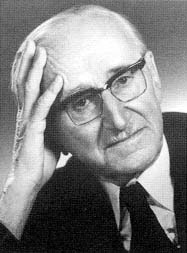
Friedrich Hayek
The idea that temporary dictatorships, even if murderous, might sometimes be necessary rubbed off onto von Mises’ student, Friedrich Hayek. Hayek argued that democracy, while desirable, can be temporarily dispensable, particularly in defence of private property.
Augusto Pinochet may have saved private property rights in Chile. But he imposed a vicious dictatorship that tortured an estimated thirty thousand civilians and murdered over three thousand.
The right to life, and freedom from torture, are existentially more basic, and hence even more important, than the right to property. Hayek visited Pinochet’s Chile and he failed to condemn these atrocious abuses of human rights. Hayek’s silence over abuses of basic human rights cannot be excused by his age: he was still publishing major books in the 1970s.
The twentieth century teaches us that Marxist socialism crushes human rights and leads to dictatorship. While opposing Communism, von Mises and Hayek (temporarily) tolerated some dictatorships and their removal of some basic human rights, including the rights of habeas corpus and to live without torture.
While earlier liberals had emphasized human rights, private property rights and democracy, in their reaction against socialism, von Mises and Hayek seemed to elevate private property rights over everything else. But private property rights require the protection of all actual or potential owners from torture or extermination. Basic human rights and democracy are vital, as well as the right to private property.
The Mont Pèlerin Society
The ideas of Mises and Hayek were prominent in the Mont Pèlerin Society, founded in Switzerland in 1947. The society accommodated a variety of views, including mainstream liberals plus some members who had collaborated with Nazism in the 1933-1945 period.
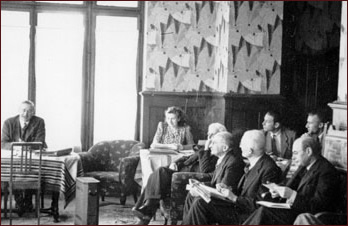 The Mont Pèlerin Society was dominated by economists. No less than eight winners of the Nobel Prize in economics have been its members.
The Mont Pèlerin Society was dominated by economists. No less than eight winners of the Nobel Prize in economics have been its members.
The influence of economists is evident in the draft statement of aims of the Society. It opened with these words:
“Individual freedom can be preserved only in a society in which an effective competitive market is the main agency for the direction of economic activity. Only the decentralization of control through private property in the means of production can prevent those concentrations of power which threaten individual freedom.”
Agoraphobics (i.e. fearers of markets) such as George Monbiot and Naomi Klein will probably disagree, but there is a vital truth in this quotation.
The trouble is that it is also a half-truth. Private property and markets are necessary but insufficient to guarantee liberty, as countless market-based totalitarian regimes, from Putin’s Russia to Pinochet’s Chile, will testify. The Mont Pèlerin statement should have made this clear. Instead it gave licence to a view that only private property and markets matter.

Margaret Thatcher and Augusto Pinochet
Hence Mont Pèlerin fans, including UK Prime Minister Margaret Thatcher and US President Ronald Reagan, supported dictatorships and opposed sanctions against South African Apartheid.
In 1999, Thatcher even thanked the former dictator Pinochet for “bringing democracy to Chile”. Clearly, while addressing someone who in 1973 overthrew a democratically-elected government, she invested the term “democracy” with an esoteric, Thatcherite meaning. In truth, Pinochet was a torturer and an assassin.
Vital differences between liberalism and Mont Pèlerin neoliberalism
Even with this brief account we can see some wide, clear water between mainstream liberals such as Macron and Mont Pèlerin “neoliberals” such as Hayek. Unlike those “neoliberals”, modern liberals uphold the following five points:
-
While markets and private property are essential, they are not sufficient to guarantee human rights and liberty. Vigilance and debate, within a democratic system with a free press, are necessary as well.
-
Dictatorships, would-be dictators and all abuses of human rights must all be condemned, in market-based as well as in centrally-planned societies.
-
-
Because the owners of capital and labour do not, and cannot, meet on a level playing field, some legally-limited trade-union activity is warranted, along with reasonable employment rights and other protections.1
-
While early liberalism was born in an era of small-scale producers, modern industrial capitalism bestows an economic (alongside a moral) need for organized mass education, social security and healthcare, along with regulations and bureaucracies to ensure that markets worked effectively and consumers are protected.
If these liberal principles were understood, along with Macron’s support for them, abstention in the May 2017 French presidential elections would be impossible.
28 April 2017
Minor edits 1, 4 May – thanks to Pedra Pereira Hors.
|
My forthcoming book elaborates on some of the political issues raised in this blog:
Wrong Turnings: How the Left Got Lost
To be published by University of Chicago Press in December 2017
|
Endnote
-
Note that Macron (like his Socialist Party predecessor François Hollande) wants to reform the blundering and counter-productive French system of employment law, rather than to abolish all employment rights, which must at least conform to standards within the European Union.
References
Caldwell, Bruce J. and Montes, Leonidas (2015) ‘Friedrich Hayek and his Visits to Chile’, Review of Austrian Economics, 28(3), pp. 261-309.
Hodgson, Geoffrey M. (2016) ‘Some Limitations of the Socialist Calculation Debate’, Schmollers Jarhbuch, 136, pp. 1-26.
Hodgson, Geoffrey M. (2017) Wrong Turnings: How the Left Got Lost (Chicago: University of Chicago Press, forthcoming).
Mirowski, Philip and Plehwe, Dieter (eds) (2015) The Road from Mont Pèlerin: The Making of the Neoliberal Thought Collective, paperback edition (Cambridge MA: Harvard University Press). (Quote from p. xvii.)
Mises, Ludwig von (1985) Liberalism in the Classic Tradition. Translated by Ralph Raico from the German edition of 1927 (Irvington, NY: Foundation for Economic Education). (See pages 47 and 51.)
Posted in Democracy, George Monbiot, Karl Marx, Left politics, Liberalism, Ludwig von Mises, Markets, Naomi Klein, Politics, Private enterprise, Property, Right politics, Socialism
February 21st, 2017 by geoffhodgson1946
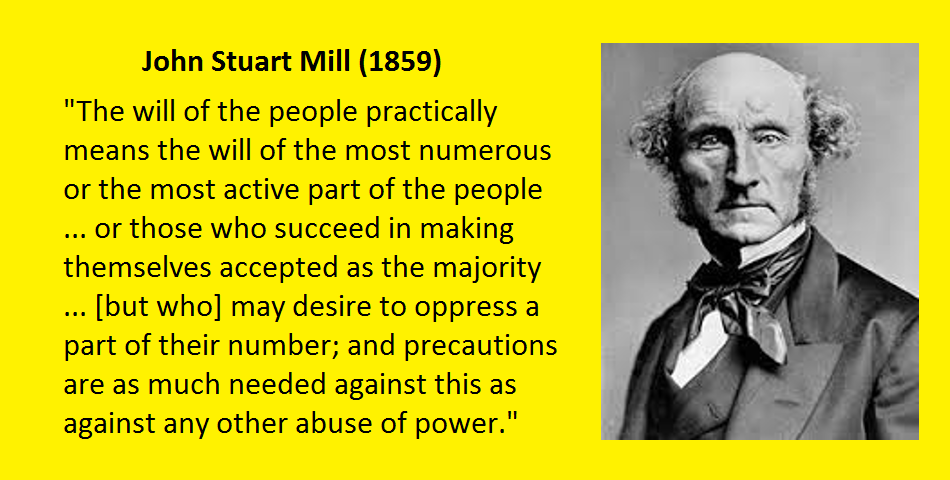
Geoffrey M. Hodgson
Despite her previous opposition to Brexit, Prime Minister Theresa May tells us that the UK must quit the European Union because it is “the will of the people”. Despite aligning himself in the Remain campaign during the referendum, opposition leader Jeremy Corbyn says that we must pursue Brexit because it is “the will of the people”. Many Labour MPs, who are critical of Corbyn and believe that leaving the EU will be a disaster, voted to start the exit process, without any guarantees or conditions, because it is “the will of the people”.
This is now the dreadful state of our democracy. On crucial matters such as immigration and Brexit, we are governed by tabloid headlines, opinion polls and lie-infested referendums. The “will of the people” has become the catch-phrase of the cowering, lazy or unprincipled politician. No longer driven by truth or principle, many of them knowingly connive in disaster because it is regarded as the peoples’ will.
Where can following “the will of the people” lead?
Polls show that the use of torture has sometimes, even recently, received majority support from the US public. President Donald Trump was elected after expressing a desire to re-introduce torture. Torture is “the will of the American people” – as some might put it.
But the use of torture has been against the Eighth Amendment to the United States Constitution since 1791. The very role of a constitution is to help protect rights and freedoms, even if “the will of the people”, or of a deviant President or Prime Minister, would take them away. One of the limits to democracy is that it should not be able to overturn our human rights.
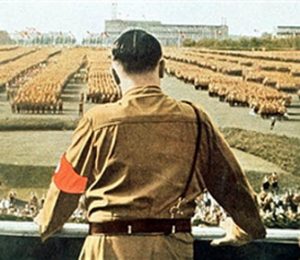 Dictators and populists are fond of referendums because they deploy “the will of the people” against constitutional safeguards. Hitler held a referendum in 1933, to garner mass support to withdraw from the League of Nations. In 1934 he held another referendum, which endorsed his bid for supreme power in Germany. Yet another referendum in 1936 ratified Hitler’s military occupation of the Rhineland and his one-party state. A fourth referendum in 1938 approved Hitler’s annexation of Austria. All propositions in these plebiscites received huge majorities.
Dictators and populists are fond of referendums because they deploy “the will of the people” against constitutional safeguards. Hitler held a referendum in 1933, to garner mass support to withdraw from the League of Nations. In 1934 he held another referendum, which endorsed his bid for supreme power in Germany. Yet another referendum in 1936 ratified Hitler’s military occupation of the Rhineland and his one-party state. A fourth referendum in 1938 approved Hitler’s annexation of Austria. All propositions in these plebiscites received huge majorities.
The death penalty
In recent polls in the USA, 60 per cent of the adult population supported the death penalty for murder, despite 64 per cent also believing that it does not lower the murder rate and 59 per cent believing that innocent people had been wrongly executed in the previous five years.
 In the UK in 1983, around 75 per cent of people were in favour of the death penalty. Although recent polls show a lower level of support, it is still close to 50 per cent.
In the UK in 1983, around 75 per cent of people were in favour of the death penalty. Although recent polls show a lower level of support, it is still close to 50 per cent.
Imagine that we had a referendum to re-introduce the death penalty in the UK. Thanks to some reactionary newspapers, it is possible that the proposal would gain majority support. But that does not justify its re-introduction, even if it was “the will of the people”. The morality of a law cannot be decided by popular vote.
Should homosexual acts be legal?
In some states of the USA there were laws prohibiting sodomy (between same-sex or different-sex couples) until 2003. As recently as 2004, the number of people polled in the USA who thought that homosexual acts should be illegal exceeded the number who thought they should be legal.
 By these measures, according to “the will of the people” homosexual acts should not have been made legal in 2003 or 2004.
By these measures, according to “the will of the people” homosexual acts should not have been made legal in 2003 or 2004.
But opinions change. This is another major problem with being governed by “the will of the people”.
After 2004, support in the USA for the legality of homosexual acts rose steadily. By 2016, the number supporting legality exceeded the contrary view by 40 per cent.
in the UK, as recently as 1998, 50 per cent of respondents in a poll thought that homosexual acts were “always” or “mostly” wrong, compared with 31 per cent saying they were “rarely” or never wrong.
Since then, opinion has switched, largely because leading politicians in the Tory as well as other major parties (with the notable exception of UKIP) have countered a sizeable segment of public opinion and underlined gay rights as a matter of principle.
By 2012, only 28 per cent of respondents in the UK thought that homosexual acts were “always” or “mostly” wrong, compared with 57 per cent saying they were “rarely” or never wrong. The will of the people can change.
The “will of the people” can be wrong or immoral
Whatever the “will of the people”, homosexual acts are either morally admissible or immoral. Moral principles are not determined by referendums or opinion polls.
 Instead, they must be the subject of ongoing, informed debate, guided by the need to minimise harm, alongside “an egalitarian conception of the good, focusing on equal opportunities for a worthwhile life” (as Philip Kitcher puts in his important book on The Ethical Project).
Instead, they must be the subject of ongoing, informed debate, guided by the need to minimise harm, alongside “an egalitarian conception of the good, focusing on equal opportunities for a worthwhile life” (as Philip Kitcher puts in his important book on The Ethical Project).
Consider another illustration. In 1984, 49 per cent of the UK public agreed “a man’s job is to earn money; a woman’s job is to look after the home and family”. But by 2012, only 13 per cent subscribed to this view.
Considerations of equal rights and equality of opportunity militate against such gendered attitudes and the discrimination that they sustain. While there is much more to be done, arguments have been won, opinions have changed and progress has been made. People can be persuaded that their previous opinions were wrong.
The need for experts
Just as votes cannot establish what is moral or immoral, they cannot determine what is scientifically valid and what is not. A majority of Americans would disregard claims concerning human-induced climate change. For many Americans, they are all part of a “hoax” to promote more intervention by the Federal Government.
Democratic votes cannot establish the veracity of scientific claims. Science proceeds through detailed scrutiny of claims by experts in a specialist field and a dialogue of different expert views. It thus creates an evolving consensus over what truths have been established and what research must be prioritised for further investigation.
 In the case of climate change, there is a strong consensus that human activity is leading to global warming. Albeit imperfect, this is the best indication we have of scientific truth. It is not the opinion of the general public, most of whom do not understand climate science.
In the case of climate change, there is a strong consensus that human activity is leading to global warming. Albeit imperfect, this is the best indication we have of scientific truth. It is not the opinion of the general public, most of whom do not understand climate science.
Another common fallacy, perpetrated by people who do not understand economics, is that we should treat the budgeting problems of a national economy in the same way that we treat our individual or household budgets. This is the “every housewife knows” economics of Margaret Thatcher and her ilk.
This mistaken view ignores the capacity of many sovereign states to issue money and sustain deficits: unlike individuals or firms, such states cannot go bankrupt. It ignores the fact that what may be true for an individual may not be true in the aggregate, as Keynesians and others have pointed out for decades.
Many economists (possibly most economists in the UK) accept this Keynesian argument. But it is difficult to get the point across to the general public, so that they elect governments that pursue austerity policies, which reduce aggregate demand and economic growth, leading to increased debt.
The role of democracy
If the behaviour of most British MPs over Brexit were taken as a guide, there would be no role for MPs at all. They blindly follow “the will of the people”, even when they know that it will lead to adverse economic and political outcomes.
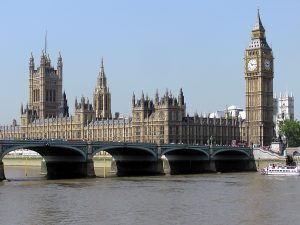 If this were a valid guiding rule, then MPs would be redundant. They could be replaced by online opinion polls on every question. The public would be invited to vote over every piece of legislation and “the will of the people” could be upheld.
If this were a valid guiding rule, then MPs would be redundant. They could be replaced by online opinion polls on every question. The public would be invited to vote over every piece of legislation and “the will of the people” could be upheld.
Before long we might be putting immigrants in sealed trains to remote or foreign destinations, and publicly flogging delinquents to teach them a lesson.
Democracy is vital not because it provides a means of implementing “the will of the people” on any specific proposal. The primary purpose of democracy is to legitimate government. It replaces unacceptable claims that rulers are legitimised by the “will of God” or by their family lineage.
There is a strong case for improving our democratic institutions, and the functioning of democracy itself. There are also forceful arguments for increasing participation in some local and workplace decisions, where we are intimately affected and have local knowledge. But there are severe practical and moral limits to the extension of democracy over all our affairs.
At least at the national level, in any large and complex socio-economic system, democracy must involve representatives rather than delegates. Representatives must be given some autonomy to seek expert advice and make judgments on complex issues. Extensive participatory democracy in such circumstances is both unfeasible and undesirable.
Members of Parliament receive a mandate from their electorates to represent their interests. Representing interests does not mean polling opinions: that is the lazy and irresponsible option. Instead it is a matter of exercising informed judgment. It is a question of deliberation and interpretation, involving the use of expert advice. We know that MPs often get things wrong. That is why their constituents have the opportunity to remove them at the next election.
The reactionary media are not solely to blame
The reactionary media and their malign influence on public opinion are not the sole cause of the current political malaise in Britain and the USA. Among others, one can blame the intellectually-lazy part of the Left, which trots out the mantra of “democratic control” whenever it sees a policy problem.
One can also blame the majority of economists, who have abandoned all moral considerations save for utility maximisation (or mere “satisfaction”) by “rational fools” (the term used by Nobel Laureate Amartya Sen).
Hence it is not just the reactionary media that are to blame. Many political activists have been intellectually lazy for too long. We need an enhanced and better-informed conversation concerning rights, morality and practical institutional design.
Armed with this knowledge, we need to hold our representatives to account, and expose the laziness and lack of principle of those who blindly follow “the will of the people”. If they see themselves as nothing more than unintelligent voting machines, then they should give up their positions to others, who would be guided by moral principles and offer greater dedication to the true interests of the people that they are supposed to serve.
21 February 2017
Minor edits – 28 February, 7 March, 4 May
|
This book elaborates on some of the political issues raised in this blog:
Wrong Turnings: How the Left Got Lost
Published by University of Chicago Press in January 2018
|
Bibliography
Hodgson, Geoffrey M. (2017) Wrong Turnings: How the Left Got Lost (Chicago: University of Chicago Press, forthcoming).
Kitcher, Philip (1993) The Advancement of Science: Science without Legend, Objectivity without Illusions (Oxford and New York: Oxford University Press).
Kitcher, Philip (2011) The Ethical Project (Cambridge MA: Harvard University Press).
Sen, Amartya K. (1977) ‘Rational Fools: A Critique of the Behavioral Foundations of Economic Theory’, Philosophy and Public Affairs, 6(4), pp. 317-44.
Posted in Brexit, Democracy, Left politics, Liberalism, Nationalization, Property, Uncategorized
November 4th, 2016 by geoffhodgson1946
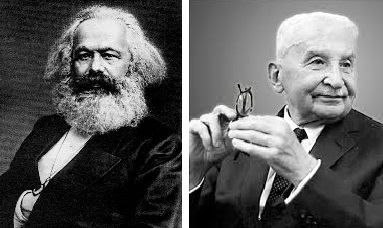
Geoffrey M. Hodgson
Property is a key concept. It is central to major ideological debates in politics and to much analysis in the social sciences.
Libertarians such as Nobel Laureate Milton Friedman, Nobel Laureate Friedrich Hayek and the leading Austrian economist Ludwig von Mises argued that the protection of private property is a vital condition for economic prosperity and individual liberty.
By contrast, socialists such as Robert Owen and Karl Marx called for the abolition of private property. They favoured the common ownership of the means of production, distribution and exchange.
But, despite their diametrically-opposed political views, key protagonists such as von Mises and Marx shared a similar, but deeply-flawed, understanding of the nature of property. Later economists have compounded this error, even in the so-called “economics of property rights”, as developed by Armen Alchian, Yoram Barzel and others.
This misunderstanding of the nature of property has major adverse consequences. Historical debates about the role of property rights in the development of capitalism have been impaired. Defective advice continues to be given to governments in developing countries, neglecting the way that property enmeshes with financial and state institutions.
Property as natural versus property as a historically-specific institution
Writers defending private property often argue that ownership is ubiquitous, not simply among early humans but also in other species. Animals compete, as either individuals or groups, over territory. Psychologists provide evidence of deeply rooted feelings concerning possession among human infants. So it is claimed that notions of property are enduring and hard-wired into the neuro-systems of humans and other animals.
 But feelings of possession are not the same thing as rights to property. The psychologist Lawrence Kohlberg pioneered the study of how individual humans develop an understanding of justice and morality from birth to adulthood.
But feelings of possession are not the same thing as rights to property. The psychologist Lawrence Kohlberg pioneered the study of how individual humans develop an understanding of justice and morality from birth to adulthood.
He and his colleagues demonstrated that it takes young humans a long time to distinguish between “I want X” or “X is mine”, on the one hand, and “I have a moral right to X”, on the other.
Similarly, the leading legal theorist Antony Honoré wrote in a classic article on ownership:

Antony Honoré
“To have worked out the notion of ‘having a right to’ as distinct from merely ‘having’ … was a major intellectual achievement. Without it society would have been impossible.”
Brute possession differs from moral or legitimate rights. But as Kohlberg lamented, some people grow up and never understand the difference.
If Marx or von Mises did grow up to learn the difference, then they made very little use of it in their writings.
Take von Mises first. He wanted to develop a theory of human action that would apply to the entire lifetime of our species. So, for example, von Mises’s concept of “exchange” is not limited to trade or contract over property, but applies to any form of human interaction, including the activities of Robinson Crusoe alone on his island.
Similarly, von Mises turned property into a concept that applies to all human history. When he considered property in his critical book on Socialism he put the brute fact of de facto control first:
“ownership is the having of the goods … This having may be called the natural or original ownership, as it is purely a physical relationship of man to the goods, independent of social relations between men or of a legal order.”
So does law have any place in our understanding of property? Von Mises continued:
“Economically … the natural having alone is relevant, and the economic significance of the legal should have lies only in the support it lends to the acquisition, the maintenance, and the regaining of the natural having.”
Hence, for von Mises, ownership was natural, asocial and ahistorical rather than legal or institutional. It was about “having” or possession. He downgraded the institutions required for the legitimation, protection and enforcement of the capacity to have, and neglected social aspects of ownership that may signal power or status.
Marx’s concept of property
Marx differed from von Mises, and not simply because he wanted to abolish private property. Marx also insisted that capitalist phenomena, including commodity exchange and markets, were historically specific and had not existed for all time.
But Marx’s concept of property was almost as broad as that of von Mises. Both concentrated on raw physical power over objects, rather than legal rights. Marx’s numerous discussions of “property” had little to say about legal rights, and he too conflated property with possession.
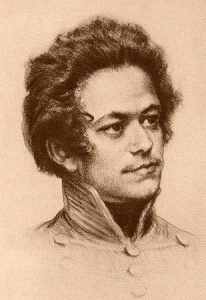
Karl Marx as a Young Man
Hence Marx in 1844 addressed “private property” and argued that “an object is only ours when we have it – … when we directly possess, eat, drink, wear, inhabit it, etc., – in short, when we use it.”
The distinction between property and possession was central to Pierre Joseph Proudhon’s famous 1840 book What is Property? Marx stridently criticized Proudhon’s work. But he paid little heed to its central distinction between possession and property.
With both Marx and von Mises, effective power over something, took priority over any legal or moral right. Legal and moral aspects of property were overshadowed.
While von Mises emphasized ownership by individuals, Marx defined social classes in terms of “property relations”, referring to what class controlled, and what class did not control, the means of production. Where von Mises stressed individuals, Marx stressed social classes. But for both of them it was a matter of control or possession.
Marx also claimed that tribal and hunter-gatherer societies owned “property” in common. This was “primitive communism”.
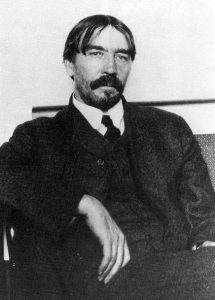
Thorstein Veblen
In response, the American institutional economist Thorstein Veblen argued convincingly in an 1898 essay that ownership and property were later institutional developments: “no concept of ownership, either communal or individual, applies in the primitive community. The idea of communal ownership is of a relatively later growth.”
This rightly implies that property means more than mere possession. Property requires historically specific institutions that did not exist in tribal societies. Property requires law and a state.
While the distinction between possession and property is ignored by Marxists and most modern economists, it is of supreme analytical and practical significance. It is impossible to understand capitalism in terms of mere possession, without an adequate conception of property.
Property: taking the law into account
Both Marx and von Mises put law on the surface of a more fundamental reality beneath: law was part of the “superstructure”, as Marx put it. More fundamental for both of them were brute powers of possession or control. For Marx, law simply “mirrored” those basic powers. For von Mises, law was relevant only insofar as it strengthened that physical control. For both of them, everything concerning property boiled down to control.
Different types of property right include the right to use a tangible or intangible asset (usus), the right to appropriate the returns from the asset (usus fructus), the right to change a good in substance or location (abusus), the right to the capital derived from the use of the good as collateral, the right to sell a good (alienation), and several other rights or limitations.
Note first that the legal right to control or use (usus) is only one of several legal types of right relating to property. By focusing on control, Marx and von Mises missed other important aspects of property.
Why is this important? Crucially for the functioning of capitalism, durable and alienable property can be used by its owner as collateral. Everyone who has a mortgage uses their property to obtain a loan. Entrepreneurs use their property to raise money to invest in their business.
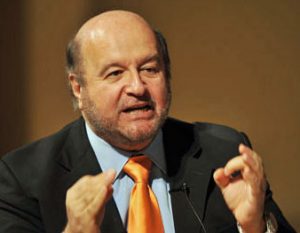
Hernando de Soto
Consequently, as Hernando De Soto has argued, the registration of much property – particularly land and buildings – with recorded means to identify both property and owners, are crucial institutional mechanisms for economic development: they enable the use of such property as collateral for loans.
But this is not straightforward, precisely because property requires a satisfactory legal system and an effective state administration.
Another problem with the views of Marx and von Mises on property is their implicit understanding of human motivation. Both neglect our propensities to obey the law – as long as we regard it as legitimate – even if it does no otherwise align with our other goals.
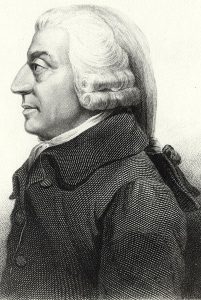
Adam Smith
Consequently, as Adam Smith pointed out long ago, the administration and perception of justice is vital for a properly-functioning market economy. Without a perception of legitimacy in the legal arrangements, the institutional order of commercial life would break down. This theme is present in both his Theory of Moral Sentiments and his Wealth of Nations.
In modern, complex societies, law helps to constitute many social structures and to configure relations of power. Law is not simply super-structural or reflective. Along with others, I have described this approach as legal institutionalism. It builds on the works of earlier writers, including the American institutional economist John R. Commons.
Property rights and Chinese economic development
Arguments emphasising the perceived legitimacy of the legal system have implications for establishing the rule of (state) law, and particularly for installing just and secure property rights to help promote economic development.
China is an important test case for these arguments. China began its market reforms in 1978 and grew rapidly thereafter. But its systems of property, commercial and corporate law are still relatively underdeveloped compared to Europe or North America.
This fact, alongside its highly impressive economic growth since 1978, has led some prominent economists – including Nobel Laureate Joseph Stiglitz – to conclude that legally-enforced property rights are of lesser significance.
 But, despite superficial appearances to the contrary, there is evidence that legal systems and legal property rights matter. China’s explosive growth started when land-use (usus fructus) rights were widely conceded to the peasants after 1978. Local power from below tentatively established de facto powers, which spread widely and became de jure when they were legally ratified by the state.
But, despite superficial appearances to the contrary, there is evidence that legal systems and legal property rights matter. China’s explosive growth started when land-use (usus fructus) rights were widely conceded to the peasants after 1978. Local power from below tentatively established de facto powers, which spread widely and became de jure when they were legally ratified by the state.
But this does not mean that the legal ratification of land-use rights was unimportant. This endorsement, along with the institutional arrangements established from below, was vital to safeguard these rights. In addition, it was part of the development of a legal system which was necessary for any modern private enterprise economy.
Legalities matter, and evidence suggests that they matter still more as capitalism develops. There is strong evidence that economic growth is correlated with the rule of law, among other factors. As Francis Fukuyama put it: “The absence of the rule of law is indeed one of the principal reasons why poor countries can’t achieve high rates of growth.”
If China is to grow still further – into the ranks of middle-income countries – then it must pay attention to the reform and development of its legal system.
The exclusive focus on control overlooks the use of property as collateral for loans. The possibility of collateralization – which relies on legal and financial institutions – cannot be derived from possession alone. Further property rights involve institutions – relations between individuals as well as relations between individuals and things. They involve the state and law – not simply relations of control between social classes.
1688 and all that
These points are significant for an important ongoing debate on the causes of the rise of capitalism in Britain in the eighteenth century.

William of Orange 1688
In a famous 1989 paper, Nobel Laureate Douglass North and Barry Weingast argued that the key event was the Glorious Revolution of 1688, when William of Orange invaded and became king in the place of James II.
North and Weingast argued that the consequent settlement between king and parliament made property more secure and prompted the development of commerce, leading to the start of the Industrial Revolution in roughly about 1760.
The first major problem with this argument is that property rights in land in England were relatively secure from the thirteenth century. There was no major change in these circumstances in the years immediately following 1688. The foremost problem was not the security of this property but the feudal nature of property rights in land, which severely restricted its possible sale and use as collateral.
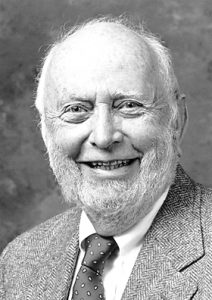
Douglass C. North
A second major problem is that over seventy years elapsed from 1688 to the beginning of the Industrial Revolution. If institutional changes relating to property after 1688 were so important, then why did they take so long to take effect? Economic growth in the 25 years after 1688 was no greater than in the preceding 25 years. Why was the take-off delayed for so long?
In my paper “1688 and all that” I offer a solution to this problem, based on a richer concept of property. The immediate effect of 1688 was to change England’s European alliances and to plunge the country into a series of wide-ranging wars, particularly against France and Spain.
The 1689 accord between King and Parliament made possible major changes in state administration and financial institutions, so that money could be raised to fund these wars. Guided by a more powerful Parliament, this new financial system stimulated reforms to landed property rights, the growth of collateralizable property and saleable debt, and thus enabled the Industrial Revolution.
Data on reforms of property rights show that key changes accelerated in the 1750s, making more land usable as collateral, which could be used to finance industrial ventures. Institutional changes immediately following 1688 were less to do with property: instead there is clear evidence of an immediate growth in state administration and increasing tax revenues to finance wars. This process included the formation of the Bank of England in 1694 and the growth of financial markets. Statutory legislation in 1704 helped the development of markets for debt.
Conclusion: a different perspective
This analysis suggests that the building of a state administration, which can sustain a modern monetary system and secure the use of private property as collateral, is an important precondition of rapid economic growth. Hence a stress on the “security of property rights” would be insufficient in developing countries. For more effective policies for economic development, the nature of property, and its connection with finance and politics, have to be better understood.
Neither Marx nor von Mises were particularly helpful in this regard.
Why did von Mises downplay the role of the state in his conception of property? He did so because he believed that markets and contractual exchange could function with little or no help from the state.
Why did Marx downplay the role of the state in his conception of property? He did so because he understood the state as the means by which one dominant social class exercises power over another. Marx, like von Mises, did not appreciate that under capitalism state law is necessary to constitute basic institutions such as property and contract.
Von Mises wanted a market economy with a minimal state. Marx thought that after the proletariat gained power and socialism was established, then the state would eventually “wither away”. Despite their other big differences, in theory and practice, they both thought that a large-scale complex economy could function with a minimal state. To understand property as a core institution of capitalism we need to transcend both of them.
With an improved understanding of the nature of property, we need to analyse data on its functioning in the developing world. In economic history we need more empirical studies of the role of lending, collateral and finance, in the growth of business and innovation.
Researchers should arise from slumbering in the Marx-Mises bed and set to work.
4 November 2016
Minor edits – 5-7 November, 7 December 2016
|
This book by G. M. Hodgson elaborates on some of the political issues raised in this blog:
Wrong Turnings: How the Left Got Lost
Published by University of Chicago Press in January 2018
|
Bibliography
Commons, John R. (1924) Legal Foundations of Capitalism (New York: Macmillan).
De Soto, Hernando (2000) The Mystery of Capital: Why Capitalism Triumphs in the West and Fails Everywhere Else (New York: Basic Books).
Deakin, Simon, Gindis, David, Hodgson, Geoffrey M., Huang, Kainan and Pistor, Katharina (forthcoming) ‘Legal Institutionalism: Capitalism and the Constitutive Role of Law’, Journal of Comparative Economics, print forthcoming, published online.
Fukuyama, Francis (2011) The Origins of Political Order: From Prehuman Times to the French Revolution (London and New York: Profile Books and Farrar, Straus and Giroux).
Heinsohn, Gunnar and Steiger, Otto (2013) Ownership Economics: On the Foundations of Interest, Money, Markets, Business Cycles and Economic Development (London and New York: Routledge).
Hodgson, Geoffrey M. (2015) Conceptualizing Capitalism: Institutions, Evolution, Future (Chicago: University of Chicago Press).
Hodgson, Geoffrey M. (2015) ‘Much of the “Economics of Property Rights” Devalues Property and Legal Rights’, Journal of Institutional Economics, 11(4), December, pp. 683-709.
Hodgson, Geoffrey M. (2017) ‘1688 and All That: Property Rights, the Glorious Revoution and the Rise of British Capitalism’, Journal of Institutional Economics, 13(1), March, print forthcoming, available free (open access) online.
Hodgson, Geoffrey M. (2017) Wrong Turnings: How the Left Got Lost (Chicago: University of Chicago Press).
Honoré, Antony M. (1961) ‘Ownership’, in Guest, Anthony G. (ed.) (1961) Oxford Essays in Jurisprudence (Oxford: Oxford University Press), pp. 107-47. Reprinted in the Journal of Institutional Economics, 9(2), June 2013, pp. 227-55.
Kohlberg, Lawrence (1969) ‘Stage and Sequence – the Cognitive-Developmental Approach to Socialization’, in D. A. Goslin (ed.) (1969) Handbook of Socialization Theory and Research (Chicago: Rand McNally).
Marx, Karl (1975) Early Writings (Harmondsworth: Penguin).
Mises, Ludwig von (1981) Socialism: An Economic and Sociological Analysis, translated from the second (1932) German edition of von Mises’s Die Gemeinwirtschaft (Indianapolis: Liberty Classics).
Mises, Ludwig von (1949) Human Action: A Treatise on Economics (London and New Haven: William Hodge and Yale University Press).
North, Douglass C. and Weingast, Barry R. (1989) ‘Constitutions and Commitment: The Evolution of Institutions Governing Public Choice in Seventeenth-Century England’, Journal of Economic History, 49(4), December, pp. 803-32.
Proudhon, Pierre Joseph. (1890) What is Property? An Inquiry into the Principle of Right and Government, translated from the French edition of 1840 (New York: Humbold).
Smith, Adam (1759) The Theory of Moral Sentiments; or, An Essay Towards an Analysis of the Principles by which Men Naturally Judge Concerning the Conduct and Character, First of their Neighbours, and Afterwards of Themselves (London and Edinburgh: Millar, and Kincaid and Bell).
Smith, Adam (1776) An Inquiry into the Nature and Causes of the Wealth of Nations, 2 vols, (London: Strahan and Cadell).
Stiglitz, Joseph E. (1994) Whither Socialism? (Cambridge, MA: MIT Press).
Tyler, Tom R. (1990) Why People Obey the Law (New Haven: Yale University Press).
Veblen, Thorstein B. (1898) ‘The Beginnings of Ownership’, American Journal of Sociology, 4(3), November, pp. 352-65.
Posted in Common ownership, Karl Marx, Liberalism, Ludwig von Mises, Markets, Private enterprise, Property Tagged with: Property


 The conceptual and practical degradation of civil society is but one of the roots of totalitarianism within Marxism.
The conceptual and practical degradation of civil society is but one of the roots of totalitarianism within Marxism. 
 Subsequently, other Eastern European intellectuals such as Jacques Rupnik called for “the rebirth of civil society”. After the formation of the mass trade union movement Solidarity in Poland in 1980, still more voices were added. The Hungarian Andrew Arato wrote in 1981 of the new dissident wave:
Subsequently, other Eastern European intellectuals such as Jacques Rupnik called for “the rebirth of civil society”. After the formation of the mass trade union movement Solidarity in Poland in 1980, still more voices were added. The Hungarian Andrew Arato wrote in 1981 of the new dissident wave: There is a widespread tendency to use the language of trade and markets to describe phenomena that are neither traded nor markets. I gave some examples in my
There is a widespread tendency to use the language of trade and markets to describe phenomena that are neither traded nor markets. I gave some examples in my  This transforms the Enlightenment argument that the government must be legitimated by representative democracy, rather than by tradition or divine rule. The “political market” makes democracy a market, and market-like criteria become the overriding source of legitimation for everything.
This transforms the Enlightenment argument that the government must be legitimated by representative democracy, rather than by tradition or divine rule. The “political market” makes democracy a market, and market-like criteria become the overriding source of legitimation for everything. Through notions such as “political markets” and “markets for laws”, market universalist “neoliberals” reduce the state and its legal system to a grand marketplace. The state and law become additional markets alongside others. The policy temptation is the practical marketization of the state and the doctrinal denial of the autonomy of politics.
Through notions such as “political markets” and “markets for laws”, market universalist “neoliberals” reduce the state and its legal system to a grand marketplace. The state and law become additional markets alongside others. The policy temptation is the practical marketization of the state and the doctrinal denial of the autonomy of politics.


 Other countries have turned in the same direction, including the United States under Donald Trump and Russia under Vladimir Putin. Previously, both Soviet-style and fascist economies have embraced economic nationalism. China has continued along this road, even after its acceptance of private enterprise and a market economy.
Other countries have turned in the same direction, including the United States under Donald Trump and Russia under Vladimir Putin. Previously, both Soviet-style and fascist economies have embraced economic nationalism. China has continued along this road, even after its acceptance of private enterprise and a market economy.

 With his 1995 changes to Clause Four of the Labour Party Constitution, Blair brought in an explicit commitment to a dynamic private sector. Labour stood for an economy where “the enterprise of the market and the rigour of competition are joined with the forces of partnership and co-operation”. Corbyn has returned to the spirit of Labour pre-1995 constitution, even if he has not yet changed the wording.
With his 1995 changes to Clause Four of the Labour Party Constitution, Blair brought in an explicit commitment to a dynamic private sector. Labour stood for an economy where “the enterprise of the market and the rigour of competition are joined with the forces of partnership and co-operation”. Corbyn has returned to the spirit of Labour pre-1995 constitution, even if he has not yet changed the wording.
 By exiting the EU Single Market, and by walking away from EU trade deals with non-EU countries that benefit EU member states, Labour and the Tories would threaten the UK economy with a massive downturn. The British economy would fall off a cliff.
By exiting the EU Single Market, and by walking away from EU trade deals with non-EU countries that benefit EU member states, Labour and the Tories would threaten the UK economy with a massive downturn. The British economy would fall off a cliff.



 I had written a book entitled The Democratic Economy where I argued that socialists should support a permanent private sector in the economy. The book was published by Penguin in 1984. Another influential work at the time was Alec Nove’s Economics of Feasible Socialism, which also argued for a substantial role for markets.
I had written a book entitled The Democratic Economy where I argued that socialists should support a permanent private sector in the economy. The book was published by Penguin in 1984. Another influential work at the time was Alec Nove’s Economics of Feasible Socialism, which also argued for a substantial role for markets. There was a commitment to “political pluralism” and to “economic pluralism” involving “a variety of forms of common ownership … and the toleration of a small private sector including self-employed workers and other private firms.” The economy must be dominated by mechanisms of “democratic planning … but also accommodating a market mechanism in some areas.”
There was a commitment to “political pluralism” and to “economic pluralism” involving “a variety of forms of common ownership … and the toleration of a small private sector including self-employed workers and other private firms.” The economy must be dominated by mechanisms of “democratic planning … but also accommodating a market mechanism in some areas.”

 But while old ideas within Labour had survived, the structure of the party and its electoral base had changed enormously in the period from 1983 to 2015. Kinnock had relied on the moderating force of the trade unions, to fight the hard left and move the party toward electability. But by 2015 the unions had been gravely weakened and several had moved toward the hard left.
But while old ideas within Labour had survived, the structure of the party and its electoral base had changed enormously in the period from 1983 to 2015. Kinnock had relied on the moderating force of the trade unions, to fight the hard left and move the party toward electability. But by 2015 the unions had been gravely weakened and several had moved toward the hard left.

 Even the foremost historians of “the neoliberal project” have acknowledged the problem. Philip Mirowski and Dieter Plehwe wrote:
Even the foremost historians of “the neoliberal project” have acknowledged the problem. Philip Mirowski and Dieter Plehwe wrote:

 The Mont Pèlerin Society was dominated by economists. No less than eight winners of the Nobel Prize in economics have been its members.
The Mont Pèlerin Society was dominated by economists. No less than eight winners of the Nobel Prize in economics have been its members.
 Dictators and populists are fond of referendums because they deploy “the will of the people” against constitutional safeguards. Hitler held a referendum in 1933, to garner mass support to withdraw from the League of Nations. In 1934 he held another referendum, which endorsed his bid for supreme power in Germany. Yet another referendum in 1936 ratified Hitler’s military occupation of the Rhineland and his one-party state. A fourth referendum in 1938 approved Hitler’s annexation of Austria. All propositions in these plebiscites received huge majorities.
Dictators and populists are fond of referendums because they deploy “the will of the people” against constitutional safeguards. Hitler held a referendum in 1933, to garner mass support to withdraw from the League of Nations. In 1934 he held another referendum, which endorsed his bid for supreme power in Germany. Yet another referendum in 1936 ratified Hitler’s military occupation of the Rhineland and his one-party state. A fourth referendum in 1938 approved Hitler’s annexation of Austria. All propositions in these plebiscites received huge majorities. In the UK in 1983, around 75 per cent of people were in favour of the death penalty. Although
In the UK in 1983, around 75 per cent of people were in favour of the death penalty. Although  By these measures, according to “the will of the people” homosexual acts should not have been made legal in 2003 or 2004.
By these measures, according to “the will of the people” homosexual acts should not have been made legal in 2003 or 2004. Instead, they must be the subject of ongoing, informed debate, guided by the need to minimise harm, alongside “an egalitarian conception of the good, focusing on equal opportunities for a worthwhile life” (as Philip Kitcher puts in his important book on The Ethical Project).
Instead, they must be the subject of ongoing, informed debate, guided by the need to minimise harm, alongside “an egalitarian conception of the good, focusing on equal opportunities for a worthwhile life” (as Philip Kitcher puts in his important book on The Ethical Project).  In the case of climate change, there is a strong consensus that human activity is leading to global warming. Albeit imperfect, this is the best indication we have of scientific truth. It is not the opinion of the general public, most of whom do not understand climate science.
In the case of climate change, there is a strong consensus that human activity is leading to global warming. Albeit imperfect, this is the best indication we have of scientific truth. It is not the opinion of the general public, most of whom do not understand climate science. If this were a valid guiding rule, then MPs would be redundant. They could be replaced by online opinion polls on every question. The public would be invited to vote over every piece of legislation and “the will of the people” could be upheld.
If this were a valid guiding rule, then MPs would be redundant. They could be replaced by online opinion polls on every question. The public would be invited to vote over every piece of legislation and “the will of the people” could be upheld.
 But feelings of possession are not the same thing as rights to property. The psychologist Lawrence Kohlberg pioneered the study of how individual humans develop an understanding of justice and morality from birth to adulthood.
But feelings of possession are not the same thing as rights to property. The psychologist Lawrence Kohlberg pioneered the study of how individual humans develop an understanding of justice and morality from birth to adulthood.




 But, despite superficial appearances to the contrary, there is evidence that legal systems and legal property rights matter. China’s explosive growth started when land-use (usus fructus) rights were widely conceded to the peasants after 1978. Local power from below tentatively established de facto powers, which spread widely and became de jure when they were legally ratified by the state.
But, despite superficial appearances to the contrary, there is evidence that legal systems and legal property rights matter. China’s explosive growth started when land-use (usus fructus) rights were widely conceded to the peasants after 1978. Local power from below tentatively established de facto powers, which spread widely and became de jure when they were legally ratified by the state.
